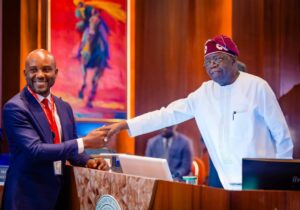By Ayo Ayodele
President Bola Ahmed Tinubu has reaffirmed his administration’s commitment to strengthening Nigeria’s diplomatic ties and sustaining ongoing economic reforms, assuring Nigerians that the country is on a stable path towards growth, stability, and long-term prosperity.
Speaking on Thursday at the Federal Executive Council (FEC) meeting in Abuja, which followed the swearing-in of two new ministers, Dr. Bernard Mohammed Doro (Humanitarian Affairs and Poverty Reduction) and Dr. Kingsley Tochukwu Udeh (Innovation, Science and Technology), the President said Nigeria’s economic reforms are gaining both national and international acceptance.

Tinubu noted that the Federal Government is actively engaging with global partners to expand economic cooperation and secure support for national development priorities.
> “Despite political headwinds and the fears of our people, we will continue to engage with partners,” he said. “The success of the $2.3 billion Eurobond, oversubscribed by 400%, is the most assuring. The task ahead is immense, but we are engaging the world diplomatically.”
On security, the President pledged that the government remains resolute in its determination to defeat terrorism and secure every part of the country. He urged Nigerians not to yield to despair.
“Are we challenged by terrorism? Yes. But we will defeat terrorism. Nigeria is one family, and we will spare no effort until we eliminate all criminals from our society,” he stated.
President Tinubu also directed ministers and senior government officials to maintain consistent communication and avoid messaging that could create confusion or undermine government efforts.
During the meeting, Minister of Finance and Coordinating Minister of the Economy, Wale Edun, briefed the Council on the nation’s economic performance. He reported that key macroeconomic indicators show Nigeria’s economy is strengthening.
Edun noted that Nigeria recorded a 4.23% GDP growth in the second quarter of 2025, the highest in a decade outside the COVID-19 rebound, and that 13 sectors posted growth above 7%. The industrial sector, he said, nearly doubled its growth rate from 3.72% to 7.45%, reflecting renewed investor confidence.
He added that inflation has declined to 18.02%, foreign reserves have risen above $43 billion, and the country recorded a trade surplus of N7.4 trillion.
Edun further highlighted Nigeria’s removal from the Financial Action Task Force (FATF) Grey List and improved IMF economic growth projections as strong indicators of global confidence in the nation’s reforms.
He stressed that the government’s goal of building a $1 trillion economy by 2030 is achievable, but would require sustained investment in infrastructure, innovation, and job-creating sectors.
The finance minister urged closer collaboration between the federal and state governments to identify and package projects capable of attracting private and foreign investment.
“Every Naira must be optimised to sustain momentum amid global funding constraints. The next phase of reforms will remove barriers holding back investors,” he said.
The meeting underscored the administration’s continued focus on economic stabilization, national security, and international engagement under the Renewed Hope Agenda.